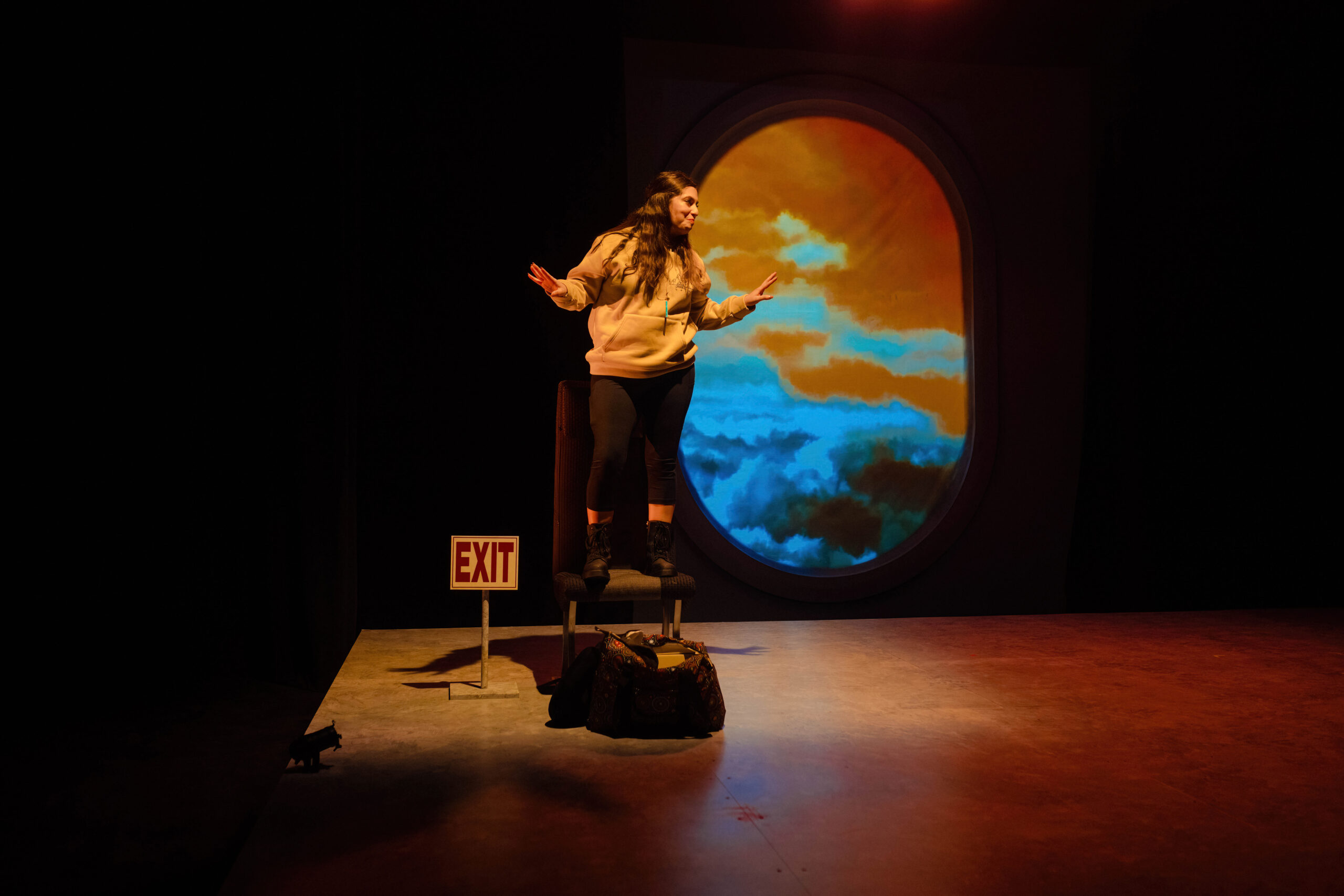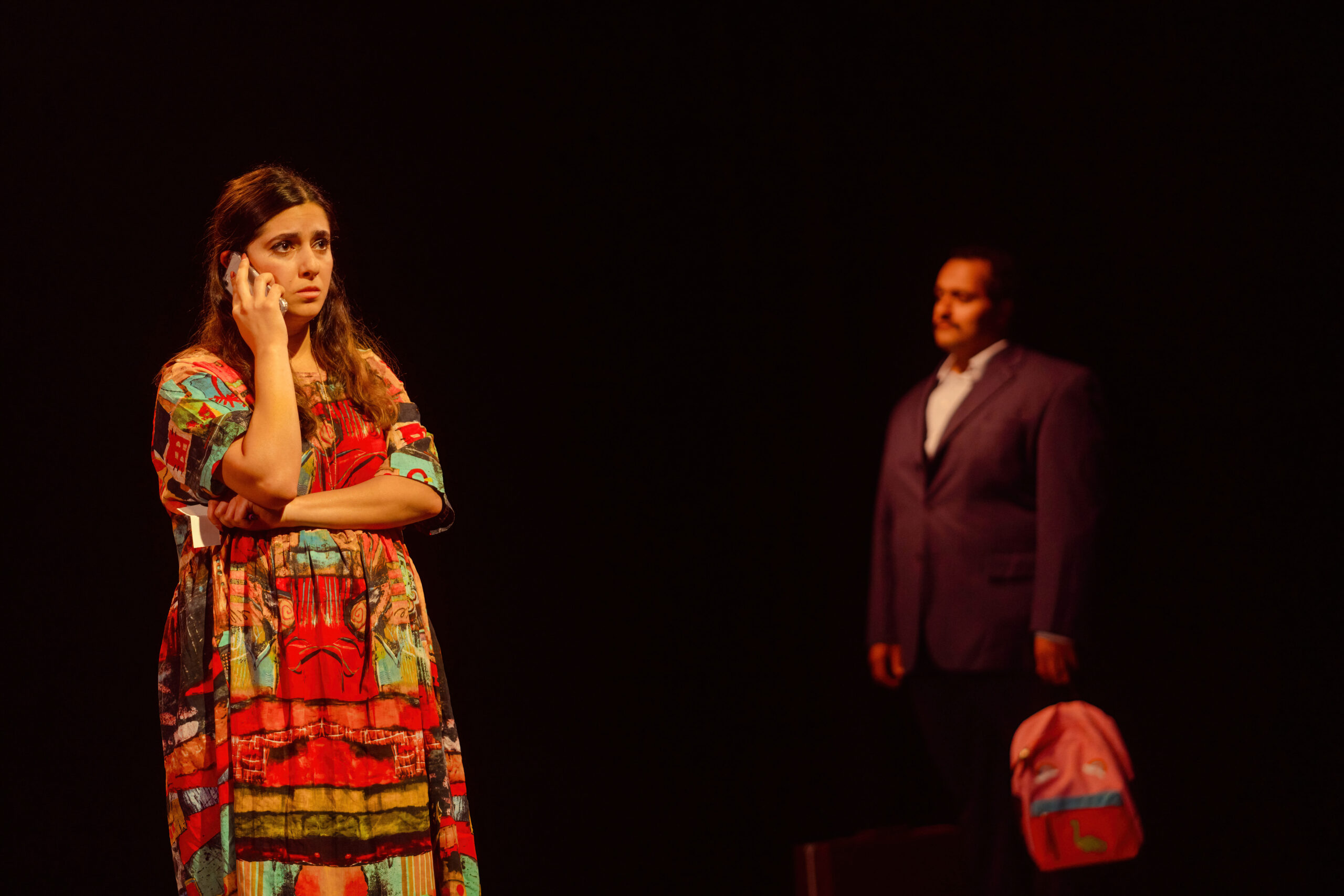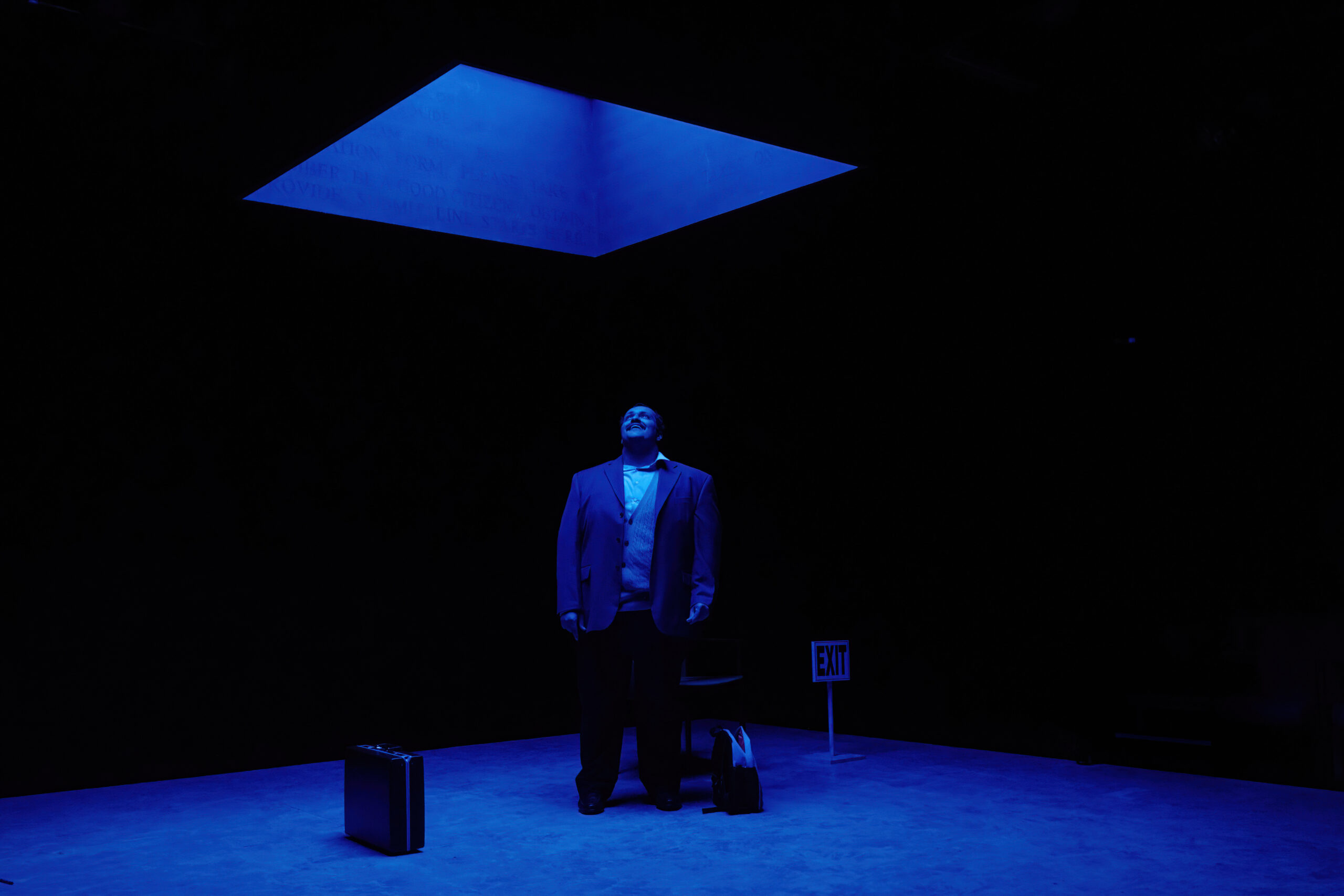BABA. By Denmo Ibrahim. Directed by Hamid Dehghani. Amphibian Stage, Fort Worth. May 6, 2023.
Reviewed by Suzi Elnaggar
Independent Scholar and Dramaturg
Baba deftly weaves a tapestry of humor and heartache, balancing the situational comedy of endless governmental bureaucracy with the emotional tumult of the immigrant experience. Written by Denmo Ibrahim, the narrative draws parallels between the maddeningly familiar frustrations of a crowded post office or DMV line and the labyrinthine journey (both emotional and physical) faced by both recent immigrants and their children.

Layla (Savannah Yasmine Elayyach) in BABA by Denmo Ibrahim, directed by Hamid Dehghani. Photo by Evan Michael Woods, provided by Amphibian Stage.
The play, structured as a two-act, features Mohammed in Act One and Layla in Act Two. The play opens in New York City in 1982, as Mohammed, an achingly friendly Egyptian immigrant, navigates the convoluted process of obtaining a passport for his young daughter Layla ahead of their trip back home to Egypt. Mohammed visits the dauntingly impersonal Office of US Passport and Immigration, his optimism gradually eroding under the onslaught of bureaucratic red tape. Through our vigil with the (mostly) patient Mohammed and the unseen presence of Layla, we gradually unravel the nuanced intricacies of their personal history. In the second act, the narrative leaps three decades ahead to 2012, revealing the adult Layla, an accomplished artist, embarking on her first trip to Cairo. As she soars through the skies, the painful complexities of Layla and Mohammed’s relationship – a relationship seemingly suspended in the amber of 1982–come to the forefront. The play culminates in an ambiguously hopeful phone call that unites both characters on stage for the first time, superimposing the events of 1982 over the reality of 2012.

Mohammed (Ahmad Kamal) and Layal (Savannah Yasmine Elayyach) in BABA by Denmo Ibrahim, directed by Hamid Dehghani. Photo by Evan Michael Woods, provided by Amphibian Stage.
Baba was initially performed as a solo act with playwright Denmo Ibrahim handling the dual roles of both father and daughter. Director Hamid Deghani’s decision to introduce two distinct actors imbues the narrative with depth and seriousness, forming a needed counterbalance to the physical and situational humor. The rigorous undertaking of essentially carrying a one-person play through each act falls on the able shoulders of Ahmad Kamal as Mohammed and Savannah Yasmine Elayyach as Layla. Kamal excellently encapsulates Mohammed’s relatable mix of ebullient optimism and concealed frustration, as he suppresses annoyance in fear of prejudice and stereotyping. Kamal brings the depths of the immigrant experience to Mohammed, artfully portraying how Arab men are often viewed as dangerous, and thus must compensate to soothe white fears. Following Kamal’s performance, Elayyach convincingly steps into the shoes of Layla, successfully replicating Mohammed’s signature mannerisms–sharing food, incessant chatter, and distinctive physical quirks. This congruity reinforces the believable father-daughter dynamic, showcasing Elayyach’s keen understanding of her character’s inherited traits.

Mohammed (Ahmad Kamal) speaks to the unseen bureaucrat at the Office of Immigration and Passports, in BABA by Denmo Ibrahim, directed by Hamid Dehghani. Photo by Evan Michael Woods, provided by Amphibian Stage.
Dehghani’s staging of Baba distinguishes itself through well-thought-out and executed production values, particularly in sound and lighting design, while still retaining a minimalist and intimate thrust stage setup. The simplicity of the staging, primarily comprising of a chair and empty space, serves as a versatile canvas for the actors, who deftly sculpt infinite queues and crowded seating on overseas aircraft through their movements and a handful of props. Patrick J. Emile’s sound design vividly depicts unseen characters, such as the bureaucrats and the pilot of Layla’s plane; the unintelligible murmurs punctuating Mohammed’s journey through immigration bureaucracy and the chipper interjections from the pilot form an auditory map that keeps the audience attuned to the physical and emotional progression of the narrative. Notable standouts in this production are the lighting and projection design by Eric Watkins and Evan Michael Woods, respectively. Mohammed’s interactions with the unseen immigration bureaucrat are lit in an isolating blue glow emitted from a floating cubic structure which pulsates above him. The clever lighting design also breathes life into Layla’s artistic evolution, tracing her journey from doodling with crayons in a queue with her father–depicted in vibrant, multicolored illuminations that cascade from a humble coloring book onto the stage–to her current artistic endeavor, a self-portrait splashed across the window of the airplane via projections. The rich hues of the lighting and visual projections serve as both metaphor and backdrop, painting Mohammed and Layla’s story in strokes of light and shadow. The harmonious blend of these production elements not only amplifies the atmosphere but also reinforces Kamal and Elayyach’s solo performances, providing them with dynamic elements to interact with.
Amphibian Stage’s Baba weaves a profoundly personal narrative, telling a tender story of a father and daughter, Mohammed and Layla, disconnected by forces beyond their control. Grounded in Ibrahim’s personal experiences, the script captures the nuanced experiences of immigrants and their children, as well as the barriers they must cross to establish a connection with each other. Layla grapples with deep hurt over her father’s absence, a pain that parallels Mohammed’s feelings of disconnection from his homeland, Egypt. Their intertwined narratives reveal a shared longing for Egypt, though manifested differently: Mohammed yearns for a place imbued with mutual care, in contrast to his encounters with the impersonal bureaucracy in the United States and his struggle to be accepted as an Arab man, while Layla practices her limited Arabic on anyone who will stand still, signifying a desire and need to fully integrate her Egyptian heritage into her identity.
A noteworthy aspect of this production is the casting of Dallas native Elayyach, who, despite her fifteen-year acting career, has never before had the opportunity to portray an Arab character. Her portrayal of Layla emphasizes the significant need for more authentic representation in theatre and the arts more broadly. Amphibian Stage’s Baba does precisely what theatre should strive to achieve—tell genuine stories that foster deep human connections and provide underrepresented groups such as the MENA community the much-needed space for their narratives to be heard and understood. This play stands as an exemplar of how theatre can explore complex sociocultural themes while simultaneously offering an intimate portrayal of human emotions and relationships.
Suzi Elnaggar is an Egyptian-American freelance dramaturg, performance scholar, and theatre-maker. She was a 2021 Kennedy Center Dramaturgy Intensive Fellow and works as both a developmental and production dramaturg. She holds a Master of Arts in Theatre Studies from Baylor University, where she researched the work of Heather Raffo through the lens of trauma studies. Her research interests include recontextualizing Greek tragedy, post-colonial theatre contexts, theatre of social change, and work that centers around SWA/MENA (Southwest Asian/Middle Eastern and North African) experiences. Her scholarship and practice center community, collaboration, and context.

Arab Stages
Volume 14 (Spring 2023)
©2023 by Martin E. Segal Theatre Center Publications
Founding Editor: Marvin Carlson
Founders: Marvin Carlson and Frank Hentschker
Editor: Edward Ziter
Performance Reviews Editor: Katherine Hennessey
Book Reviews Editor: George Potter
Editorial and Advisory Board: Fawzia Afzal-Khan, Dina Amin, Khalid Amine, Dalia Basiouny, Katherine Donovan, Masud Hamdan, Sameh Hanna, Rolf C. Hemke, Areeg Ibrahim, Jamil Khoury, Dominika Laster, Margaret Litvin, Rebekah Maggor, Safi Mahfouz, Robert Myers, Michael Malek Naijar, Hala Nassar, Juan Recondo, Nada Saab, Asaad Al-Saleh, Torange Yeghiazarian.
Managing Editors: Melissa Flower Gladney and Juhyun Woo
Table of Contents:
Up There by Wael Kadour, Introduction by Edward Ziter
Baba written by Denmo Ibrahim, directed by Hamid Dehghani, reviewed by Suzi Elnaggar
Layalina written by Martin Yousif Zebari, directed by Sivan Battat, reviewed by Sami Ismat
Mother Courage adapted and directed by Alison Shan Price, reviewed by Hassan Hajiyah
Playwright Showcase, New Arab American Theater Works, reviewed by Katherine Hennessey



